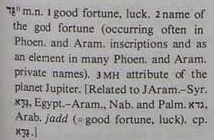I originally posted this a while ago on my blog, but someone recently suggested that I pose it as a question here.
A brief Wikipedia search on the origin of the word ‘god’ reveals the following:
The earliest written form of the Germanic word god comes from the 6th century Christian Codex Argenteus. The English word itself is derived from the Proto-Germanic * ǥuđan. Most linguists agree that the reconstructed Proto-Indo-European form * ǵhu-tó-m was based on the root * ǵhau(ə)-, which meant either ‘to call’ or ‘to invoke’.
Google came up with this link which presents a survey of various sources that attempt to decipher the origin of the word. It begins with a short summary of its conclusion, which contains the following sentence:
The word God is a relatively new European invention, which was never used in any of the ancient Judaeo-Christian scripture manuscripts that were written in Hebrew, Aramaic, Greek or Latin.
I am befuddled by the fact that they seem to have overlooked a very clear source.
In Genesis 30:11 - we read:
וַתֹּאמֶר לֵאָה בגד \ בָּא גָד
And Leah said, "gad has come."
Targum [Pseudo-]Jonathan interprets:
וַאֲמַרַת לֵאָה אָתָא מַזְלָא טָבָא
And Leah said, "the good 'mazal' (astrological sign / luck) has come."
I would assume that if ‘mazal’ = ‘gad’ then we could have a pretty good indication of where the word ‘god’ came from.
If this isn’t good enough, note the word גדא which is mentioned several times in the Talmud. See, for example, Hullin 40a:
אמר אביי לא קשיא הא דאמר להר הא דאמר לגדא דהר דיקא נמי דקתני דומיא דמיכאל שר הגדול
...Abbaye said, "it is not problematic, for this is when he said [he was slaughtering it] for the mountain and this is where he said it was for the gada (referring some heavenly minister that some would serve as a god) of the mountain...
It is quite clear from the context that גדא דהר means just that; god of the mountain!
Does anyone have any knowledge that would help in figuring out whether or not these words (גד and god) are actually related, as they seem to be?
